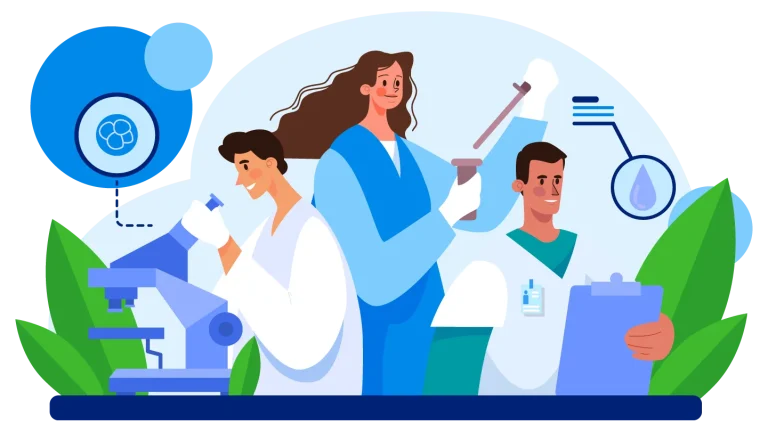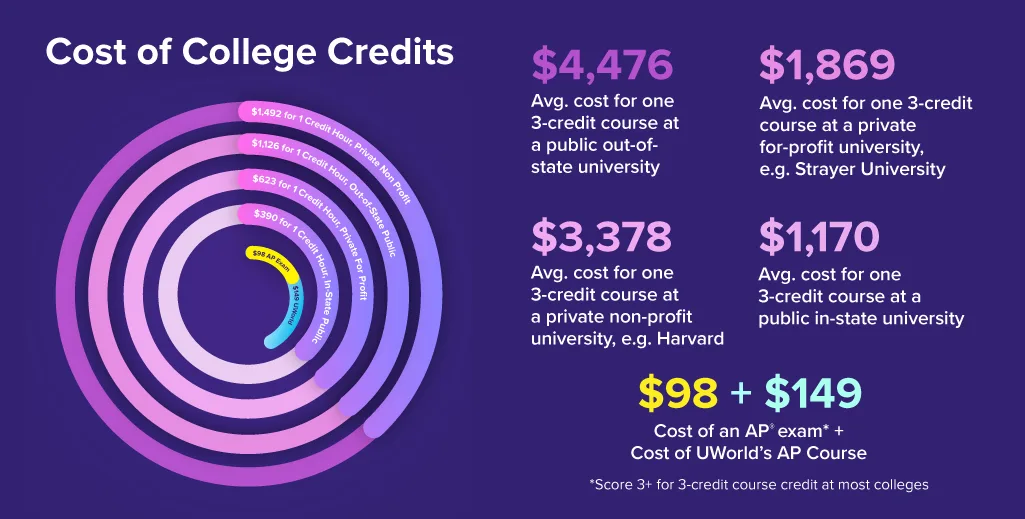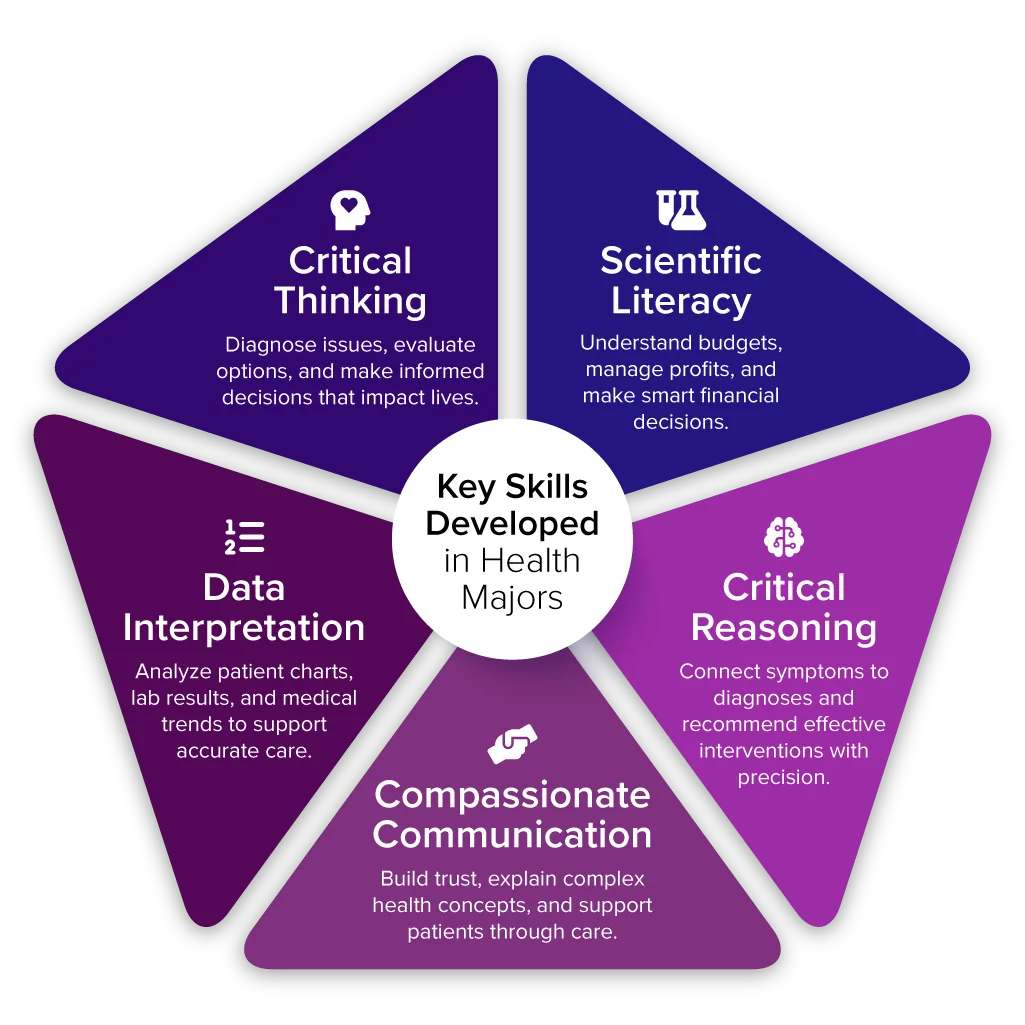As a high school student, you may already be thinking about your future career, and if healthcare interests you, you're in the right place. The healthcare field offers a wide range of career opportunities, from working directly with patients to conducting vital medical research. But how do you begin your journey? One important step is deciding whether a clinical science and health care major is the right fit for you. This decision sets the foundation for your education and career, helping you determine what kind of healthcare path you will pursue.
In this guide, we'll explore the ins and outs of health and medicine majors, how AP® courses can help you get ahead in this field, and what to expect in terms of college admissions, test scores, and future career opportunities. Whether you're passionate about medicine, nursing, research, or health administration, there's a path for you in the world of healthcare — and it starts with the right academic preparation.
Is a Health and Clinical Science Major Right for You?
Before you commit to a clinical science and healthcare major, reflect on your interests and long-term goals. Ask yourself:
- Are you fascinated by how the human body works and passionate about improving people’s health?
- Do topics like anatomy, disease prevention, patient care, and medical technology capture your curiosity?
- Are you motivated by the idea of helping others, whether directly through patient care or indirectly through clinical research?
If the answer to these questions is a strong "yes," then a clinical science and healthcare major might be the perfect fit for you. It's a dynamic field that blends science, compassion, and real-world problem solving. It could be your first step toward a rewarding healthcare or medical research career.
Understanding Health and Medicine Majors
Health professions and related clinical sciences majors encompass medicine, public health, behavioral science, and healthcare systems. Students explore how biology, healthcare practices, and social determinants intersect to affect health outcomes. Relevant courses may cover epidemiology, healthcare ethics, anatomy, and health data analysis.
Why Choose a Health and Clinical Science Degree?
If you’re passionate about healthcare and want to understand the science behind medicine, nursing, therapy, or clinical research, this field offers a gateway to high-demand careers. This degree will equip you with the scientific knowledge and practical skills necessary for a rewarding career in the healthcare industry.
Average SAT® and ACT® Scores for Students Interested in Health and Clinical Science Majors
While admissions requirements vary by college, it's helpful to understand the typical test scores for students planning to major in health and clinical sciences. The average SAT score for these majors is around 1150-1250, while ACT scores tend to fall in the 23-28 range.
Keep in mind that these numbers can vary depending on the competitiveness of the program and school. Some institutions with highly selective health science or pre-med tracks may expect higher scores. That's why it's important to research the specific expectations of each college on your list. Knowing these averages can help you set realistic score goals, identify where you stand, and make your college application as strong as possible.
Do Colleges and Universities Value AP Courses in the Health and Clinical Sciences?
Absolutely. Admissions teams recognize AP science and health-related courses as strong indicators that you're ready for college's academic rigor and challenges. These courses show that you're serious about the field and capable of handling the coursework.
But the benefits go beyond admissions. High scores on AP exams can help you save money on tuition by earning college credit. Many universities allow you to skip introductory classes, which means fewer courses to pay for, and potentially graduating early. You'll also have more room in your schedule for advanced coursework, research, or clinical experiences, giving you a competitive edge while reducing your overall college costs.
What Skills Can Be Developed as a Health and Clinical Sciences Student?
Studying health and clinical sciences isn't just about facts and figures. It's about developing the skills that future health professionals need most. You'll learn to think critically, analyze medical data, and apply scientific knowledge to real-world health problems.
You'll also get hands-on experience with collaborative work, patient communication, and ethical thinking — all key in clinical and public health careers. These skills will serve you well whether you're heading into nursing, med school, or health policy.
In-Demand Jobs for Health and Clinical Science Majors
A degree in health professions and related clinical sciences can open the door to a wide range of exciting and high-impact careers.
Highest Earning Potential Healthcare Careers (Median salary above $110,000)
These careers typically require advanced degrees such as a PharmD, DDS/DMD, or MD. They offer the highest salaries in healthcare and are best suited for students interested in specialized, long-term clinical careers with significant financial return and prestige.
| Position | Description | Relevant Majors | Median Salary |
|---|---|---|---|
| Physician General Practitioner | Diagnose illnesses, prescribe treatments, and provide primary care. | Pre-Med/Biology (MD or DO required) |
$260,000 |
| Dentist | Diagnose and treat issues with teeth, gums, and mouth health. | Pre-Dental/Biology (DDS or DMD required) |
$160,000 |
| Pharmacist | Dispense medications and advise on proper drug use. | Pharmacy (PharmD) |
$128,570 |
| Nurse Practitioner | Diagnose, treat, and prescribe for patients, often independently. | Nursing (MSN or DNP) |
$126,260 |
Advanced Practice Roles (Median salary $95,000–$150,000)
With required graduate-level education (such as a Master’s or Doctorate in Nursing, Physician Assistant Studies, or Pharmacy), these positions offer high salaries, autonomy, and strong job demand. Ideal for students committed to leadership and advanced care in healthcare.
| Position | Description | Relevant Majors | Median Salary |
|---|---|---|---|
| Physician Assistant | Examine, diagnose, and treat patients under physician supervision. | Health Sciences/Pre-PA (PA Master’s required) | $115,390 |
| Travel Nurse | Work short-term nursing jobs across different locations and settings. | Nursing (BSN) | $90,000 |
Professional-Level Careers (Median salary $60,000–$110,000)
These careers require more specialized education—often a bachelor’s or master’s degree—and may include licensure or certification. They balance education investment and earning potential and offer meaningful patient impact.
| Position | Description | Relevant Majors | Median Salary |
|---|---|---|---|
| Physiotherapist | Help patients recover movement and manage physical. | Physical Therapy (DPT) | $95,620 |
| Occupational Therapist | Help patients develop or regain daily living and work skills. | Occupational Therapy (Master’s) | $85,570 |
| Radiation Therapist | Administer radiation treatments to cancer patients. | Radiation Therapy | $86,850 |
| Audiologist | Diagnose and treat hearing and balance disorders. | Audiology (Doctorate - Au.D.) | $81,030 |
| Epidemiologist | Study disease patterns and help prevent outbreaks. | Public Health/Epidemiology (Master’s) | $78,830 |
| Head Radiologic Technologist | Lead imaging teams and perform diagnostic imaging procedures. | Radiologic Technology | $74,690 |
| Registered Nurse (RN) | Provide patient care, monitor health, and assist in treatment plans. | Nursing (BSN) | $86,070 |
| Respiratory Therapist | Treat patients with breathing issues or chronic respiratory diseases. | Respiratory Therapy | $61,810 |
| Registered Dietitian | Advise patients on nutrition, diet, and healthy eating habits. | Nutrition/Dietetics | $63,090 |
Mid-Level Careers (Median salary $50,000–$85,000)
These roles generally require an associate’s or bachelor’s degree. They offer stable salaries and are well-suited for students interested in health administration, patient support, or tech-focused positions in healthcare without the need for graduate school.
| Position | Description | Relevant Majors | Median Salary |
|---|---|---|---|
| Health Information Management Specialist | Manage patient health records and healthcare data systems. | Health Information Management | $58,250 |
| Cardiovascular Surgical Technologist | Assist during heart surgeries and prepare operating rooms. | Surgical Technology | $57,500 |
| Biomedical Equipment Technician | Install and maintain medical technology and devices. | Biomedical Engineering/Tech | $53,000 |
| Health Educator | Teach individuals and communities how to improve their health. | Public Health/Health Education | $60,600 |
| Obstetrics Surgical Technologist | Support surgical teams during childbirth-related procedures. | Surgical Technology | $54,000 |
Entry-Level Healthcare Roles (Median salary up to $50,000)
These careers are great entry points into the healthcare field and typically require a certificate or associate’s degree. They allow students to enter the workforce quickly, gain hands-on experience, and potentially pursue further education while working.
| Position | Description | Relevant Majors | Median Salary |
|---|---|---|---|
| Nursing Assistant | Help patients with basic care tasks under nurse supervision. | Nursing Assistant Certificate | $38,270 |
| Medical Assistant | Perform clinical and administrative tasks in healthcare settings. | Medical Assisting | $30,830 |
How Can AP Courses in the Health and Clinical Sciences Benefit Future Career Prospects?
Taking AP courses like Biology, Chemistry, Psychology, or Statistics in high school can give you a head start in the health and clinical sciences. Not only do they deepen your understanding of core topics, but strong AP scores can help you skip intro college courses and move straight into advanced classes that align with your career goals.
These courses also help develop key skills like scientific reasoning, critical thinking, and data interpretation that are essential for success in healthcare careers. Whether you plan to become a nurse, therapist, physician assistant, or researcher, AP courses show colleges and future employers that you’re serious, capable, and ready for the challenges ahead.
Top AP Health and Clinical Science Courses for High School Students
Taking AP courses in high school is a smart way to prepare for a health and clinical science degree. They strengthen your college applications, build a strong academic foundation, and may even earn you college credit, saving you time and tuition.
Some of the best AP courses for students who want to pursue a health and clinical science-related college major or career path include:
AP Biology
Builds core knowledge in cell biology, genetics, anatomy, and physiology.
Ideal for: Pre-med students, nurses, physical therapists, lab techs.
AP Chemistry
Covers chemical reactions, lab techniques, and molecular structures.
Ideal for: Pharmacists, medical researchers, dental or med school tracks.
AP Psychology
Explores mental health, behavior, brain function, and development.
Ideal for: Therapists, counselors, nurse practitioners, mental health professionals.
AP Statistics
Teaches how to interpret and analyze health data using real-world scenarios.
Ideal for: Public health professionals, epidemiologists, health researchers.
AP Environmental Science
Examines how the environment impacts human health and global health systems.
Ideal for: Public health workers, health educators, global health specialists.
AP English Language and Composition
Strengthens writing, analysis, and research — all essential for healthcare communication.
Ideal for: Nurses, health educators, physician assistants, and medical writers.
AP U.S. Government and Politics
Offers insight into health policy and healthcare systems.
Ideal for: Health policy analysts, healthcare administrators, and nonprofit leaders.
Builds core knowledge in cell biology, genetics, anatomy, and physiology.
Ideal for: Pre-med students, nurses, physical therapists, lab techs.
Covers chemical reactions, lab techniques, and molecular structures.
Ideal for: Pharmacists, medical researchers, dental or med school tracks.
Explores mental health, behavior, brain function, and development.
Ideal for: Therapists, counselors, nurse practitioners, mental health professionals.
Covers chemical reactions, lab techniques, and molecular structures.
Ideal for: Pharmacists, medical researchers, dental or med school tracks.
Examines how the environment impacts human health and global health systems.
Ideal for: Public health workers, health educators, global health specialists.
Sharpens quantitative skills needed for advanced medical problem-solving.
Ideal for: Pharmacists, biomedical engineers, diagnostic imaging specialists.
Strengthens writing, analysis, and research — all essential for healthcare communication.
Ideal for: Nurses, health educators, physician assistants, and medical writers.
Offers insight into health policy and healthcare systems.
Ideal for: Health policy analysts, healthcare administrators, and nonprofit leaders.
Frequently Asked Questions (FAQs)
What is the hardest health and clinical science major?
What job has the highest salary in health and clinical sciences?
What is the best health and clinical science major?
References
- Salary.com. (2021, April 1). salary.com. Retrieved April 9, 2025, from https://www.salary.com/
- Healthcare Occupations: Occupational Outlook Handbook: U.S. Bureau of Labor Statistics. (2023, September 6). bls.gov. Retrieved April 9, 2025, from https://www.bls.gov/ooh/healthcare/home.htm
- Medical and Health Services Managers: Occupational Outlook Handbook: U.S. Bureau of Labor Statistics. (2023, September 6). bls.gov. Retrieved April 9, 2025, from https://www.bls.gov/ooh/management/medical-and-health-services-managers.htm
- Mayo Clinic College of Medicine and Science. (n.d.). Health Information Manager - Explore Health Care Careers - Mayo Clinic College of Medicine & Science. college.mayo.edu. Retrieved April 9, 2025, from https://college.mayo.edu/academics/explore-health-care-careers/careers-a-z/health-information-manager/
- National Center for Education Statistics. (n.d.). Fast Facts: Most popular majors (37). nces.ed.gov Retrieved April 9, 2025, from https://nces.ed.gov/fastfacts/display.asp?id=37
- Travel nurse salary: How much do travel nurses make? (n.d.). nurse.org. Retrieved April 9, 2025, from https://nurse.org/education/travel-nurse-salary/#:~:text=ZipRecruiter%20states%20that%20telemetry%20Travel,%24124%2C122%20annually%20or%20%2460%2Fhr
- Kelly, J. (2021, September 16). The 30 Fastest-Growing Jobs And Careers For The Next 10 Years. forbes.com. Retrieved April 9, 2025, from https://www.forbes.com/sites/jackkelly/2021/09/16/the-30-fastest-growing-jobs-and-careers-for-the-next-10-years/?sh=3322f240609f
- Thirty fastest growing occupations projected to account for 19 percent of new jobs from 2016 to 2026: The Economics Daily: U.S. Bureau of Labor Statistics. (2017, October 30). bls.gov. Retrieved April 9, 2025, from https://www.bls.gov/opub/ted/2017/thirty-fastest-growing-occupations-projected-to-account-for-19-percent-of-new-jobs-from-2016-to-2026.htm
- National Center for Education Statistics. (n.d.). Fast Facts: Most popular majors (37). nces.ed.gov. Retrieved April 9, 2025, from https://nces.ed.gov/fastfacts/display.asp?id=37
- Connect AP to Careers and Majors (n.d.). apstudents.collegeboard.org. Retrieved April 9, 2025, from https://apstudents.collegeboard.org/choosing-courses/major-career-results/course/ap-biology
- Connect AP to Careers and Majors (n.d.). apstudents.collegeboard.org. Retrieved April 9, 2025, from https://apstudents.collegeboard.org/choosing-courses/major-career-results/course/ap-statistics
- Connect AP to Careers and Majors (n.d.). apstudents.collegeboard.org. Retrieved April 9, 2025, from https://apstudents.collegeboard.org/choosing-courses/major-career-results/course/ap-chemistry
- Connect AP to Careers and Majors (n.d.). apstudents.collegeboard.org. Retrieved April 9, 2025, from https://apstudents.collegeboard.org/choosing-courses/major-career-results/course/ap-psychology
- Connect AP to Careers and Majors (n.d.). apstudents.collegeboard.org. Retrieved April 9, 2025, from https://apstudents.collegeboard.org/choosing-courses/major-career-results/course/ap-calculus-ab
- Connect AP to Careers and Majors (n.d.). apstudents.collegeboard.org. Retrieved April 9, 2025, from https://apstudents.collegeboard.org/choosing-courses/major-career-results/course/ap-physics-1%3A-algebra__based
Related Articles
Maximize your college readiness with expert insights on AP course combos tailored to your humanities major. Also includes a bonus SAT score chart for your dream major!
STEM Major - AP CoursesThe ultimate AP roadmap to unlocking your STEM college dreams with customized recommendations for your planned major. Plus, SAT score chart for STEM majors to help with your college prep.
Business, Management and Related Services - AP CoursesEase your way into a major in business, management & related services with our expert AP course recommendations and SAT score chart. Prep smarter and faster!
Social Sciences Major - AP CoursesExplore key AP courses for social science majors. Discover your strengths, develop real-world skills, and ace your college journey with confidence!








